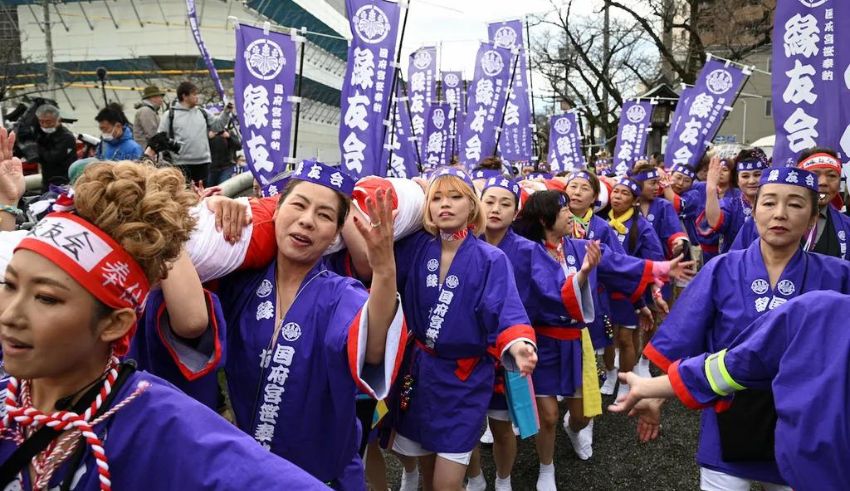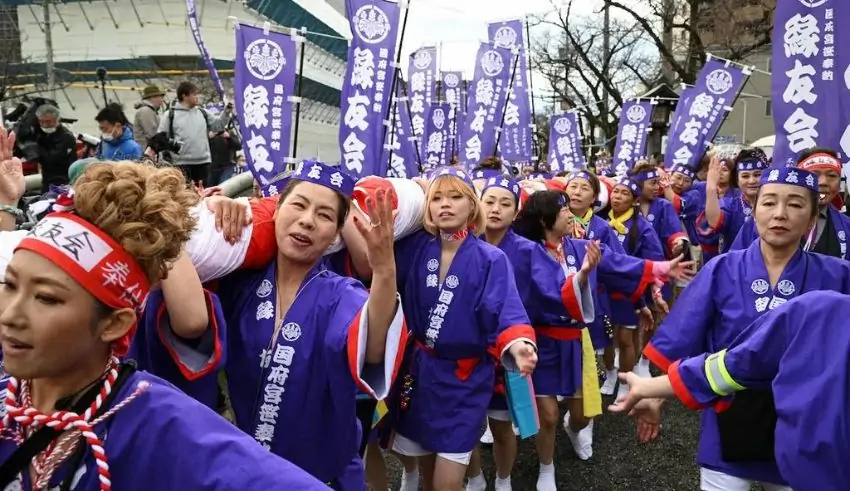

(C) Rappler
Japan’s Hadaka Matsuri, or Naked Festival, is a traditional event that dates back to over 1,200 years ago. It is held every year in February at the Konomiya Shrine in Inazawa, Aichi Prefecture.
The festival involves thousands of men wearing only loincloths and socks, who compete to touch a chosen man, or shin-otoko, who is believed to bring good luck and fortune. However, this year, for the first time in the festival’s history, women were allowed to participate in some of the rituals. Here is why this happened and what it means.
The Hadaka Matsuri, which literally means Naked Festival, is a Shinto ritual that originated in the Heian period (794-1185). According to legend, a plague broke out in the region, and the emperor sent a messenger to the Konomiya Shrine to pray for the end of the epidemic. The messenger stripped off his clothes and ran around the shrine, and the people who touched him were cured of their illness. Since then, the festival has been held annually to ward off evil and misfortune, and to pray for health and prosperity.
The main event of the festival is the naoi-shiki, or purification ceremony, which takes place on the evening of February 13. About 10,000 men, mostly locals, gather at the shrine wearing only fundoshi (loincloths) and tabi (socks). They purify themselves with cold water and sake, and then run around the shrine grounds. At around 10 p.m., the shin-otoko, or chosen man, appears. He is selected from among the participants, and is usually a man who is facing a major life change, such as marriage, divorce, or career change. He is shaved bald and wears a white fundoshi. He is escorted by two guards, who protect him from the crowd. The other participants try to touch the shin-otoko, or at least get close to him, as they believe that this will transfer his luck and fortune to them. The shin-otoko has to endure the physical pressure and pain, as well as the cold and fatigue, for about two hours, until he reaches the main hall of the shrine, where he is greeted by the priests and the spectators.
For the first time in the festival’s history, women were allowed to participate in some of the rituals this year. This was the result of a request from a group of local women, who wanted to be more involved in the festival and to share its benefits. The shrine and the organizing committee agreed to their request, and decided to let them join the naoi-zasa, or bamboo grass offering, which is a part of the naoi-shiki. The naoi-zasa involves carrying bamboo grass wrapped in cloth into the shrine grounds, and placing it near the main hall. The bamboo grass is believed to have the power to absorb impurities and misfortunes, and to bring good luck and happiness.
About 40 women, dressed in traditional happi coats, participated in the naoi-zasa this year. They carried the bamboo grass in a procession, accompanied by music and chants. They entered the shrine grounds at around 9 p.m., before the appearance of the shin-otoko. They placed the bamboo grass near the main hall, and then left the shrine. They did not join the men in the naoi-shiki, or in the pursuit of the shin-otoko. They also did not wear fundoshi or strip off their clothes, as they wanted to respect the tradition and the culture of the festival.
The women’s participation in the festival has been met with mixed reactions from the public and the media. Some have praised it as a positive and progressive step, that reflects the changing role and status of women in Japanese society. They have also welcomed it as a way to revitalize and diversify the festival, and to attract more visitors and attention. Others have criticized it as a disrespectful and unnecessary change, that violates the original spirit and meaning of the festival. They have also questioned the motives and intentions of the women, and wondered if they were seeking publicity or fame.
The women’s participation in the festival has also raised some issues and questions about the role and impact of gender and tradition in Japanese culture and religion. Some have argued that the festival is a male-dominated and patriarchal ritual, that excludes and marginalizes women, and that reinforces the stereotypes and inequalities between the sexes.
They have also suggested that the festival is a form of violence and abuse, that exploits and harms the shin-otoko, and that promotes a distorted and unhealthy view of masculinity and sexuality. Others have defended and celebrated the festival as a unique and sacred ritual, that honors and respects women, and that expresses and enhances the bond and solidarity among men. They have also claimed that the festival is a source of joy and fun, that challenges and empowers the shin-otoko, and that fosters a balanced and harmonious view of masculinity and sexuality.
Oppo is one of the forerunners of mobile production companies in the Asian market primarily for their impressive features easing…
Rock legends Foo Fighters are now officially returning to the stage in 2025 as they already made their first booking…
All eyes are now turned towards the Middle East, after the buzzing real-time announcement has been dropped on the social…
The 36-year old Indian cricketer, Ravindra Jadeja has garnered the glory of becoming the No.1 all-rounder in the Test rankings…
On 14 May 2025, three artists Ken Miyake, Hiromitsu Kitayama and Yuma Jinguji from the TOBE agency has come forward…
China’s exports of steel to ASEAN countries had significantly sky-rocketed in Q1-2025, with an astounding 36.55 million tons traded within…
This website uses cookies.
Read More